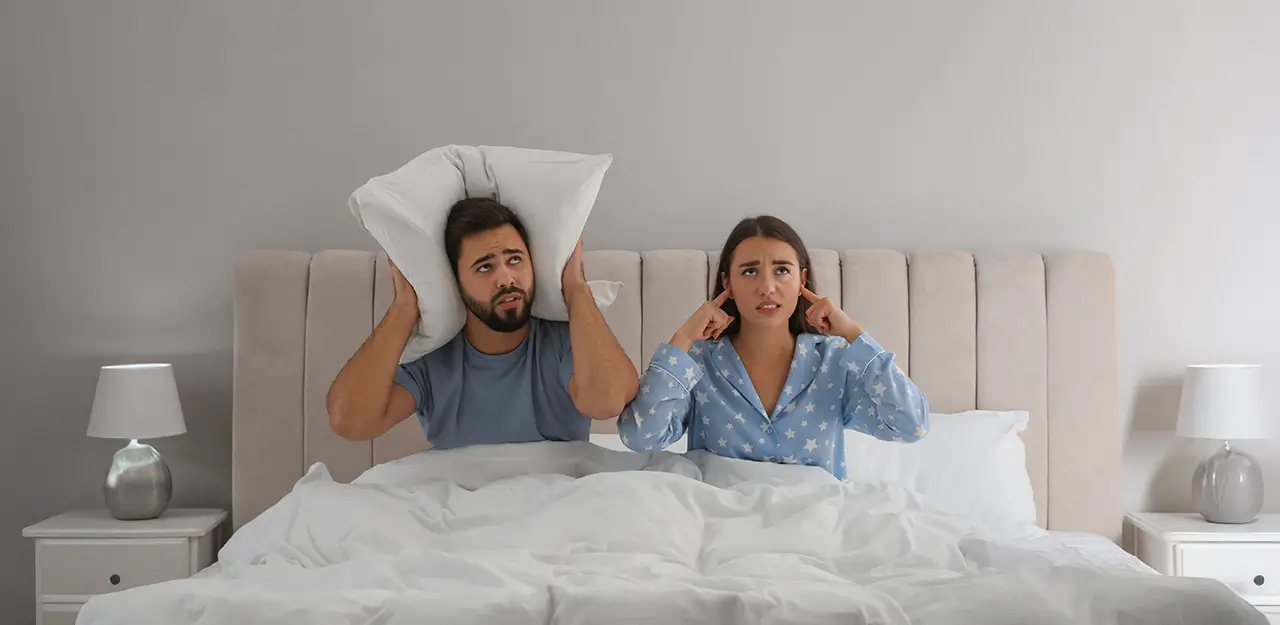
UK’s worst bedtime habits revealed – and how to fix them
We all have our little nighttime rituals – a quick scroll, a last-minute snack, maybe a Netflix episode (or three). But our new survey has revealed that our bedtime habits are wreaking havoc on our sleep quality.
From endless doomscrolling to skipping the toothbrush, our research uncovered some surprising (and somewhat worrying) trends in how the UK wind down – or don’t – before bed:
1. Doomscrolling before bed
It’s official. Doomscrolling tops the list of the UK’s worst bedtime habits, with 45% of us glued to our screens before sleep. Among 18-24 year-olds, that figure jumps to a staggering 70%.
Endless scrolling may feel relaxing, but the blue light from your phone actually delays melatonin – the hormone that helps you fall asleep. And the mental stimulation keeps your brain wired long after you’ve put your phone down.
Relationship expert, Jenni Trent Hughes, recommends setting boundaries with your devices:
“Use the function on your phone that turns off all notifications except one or two emergency numbers. I’d recommend having a small basket on the floor at the bottom of the bed where the phones go. This removes the temptation to just check it.
“Being able to cuddle up next to your loved one, hold hands or lay your head on their shoulder is ever so helpful. You should never underestimate the power of touch. Sometimes pillow talk doesn’t even involve talking and is just about silently being there together”
So while that pre-bed scroll might seem harmless, swapping it for some pillow talk, a few pages of a book, or a moment of quiet could do wonders for your sleep – and even relationship!
2. Skipping dental hygiene (yes, really)
Shockingly, 41% of adults admitted to not always brushing their teeth before bed – with rates as high as 53% in Belfast and 50% in Nottingham.
Not brushing means bacteria and food debris linger overnight, which can lead to tooth decay and gum problems. But aside from the potential dental issues, it’s proven that bedtime routines, such as brushing your teeth, can actually signal to your body that it’s time to wind down – helping you drift off more easily.
And it’s not just toothbrush neglect – 10% of UK residents surveyed skip showering after the gym. Beyond hygiene, showering can help you relax. Warm water raises your core temperature, which then drops when you get out – a signal to your body that it’s time to sleep.
So, before bed, brush, shower, and give your body the cues it needs to recharge properly.
3. Bedtime snacking
A cosy snack in bed might sound tempting, but over a third (34%) of the UK admit to eating in bed, rising to 53% among 18-24 year-olds.
While a light snack before bed isn’t the end of the world, eating in bed too often can disrupt your sleep routine – and your digestion. Late-night meals make your body work harder when it should be resting.
If you’re hungry, opt for sleep-friendly snacks like a banana or yoghurt instead of crisps or takeaways. And maybe keep the crumbs out of the sheets.
Other common bedtime habits keeping the UK awake
The research also found a few other late-night offenders:
- Falling asleep with the TV on (32%) – Just like your phone, the blue light and noise from the TV disrupt melatonin production, leading to lighter, more restless sleep.
- Using alcohol to fall asleep (15%) – A nightcap might make you feel sleepy, but alcohol interferes with deep, restorative sleep, and causes frequent waking.
- Leaving arguments unresolved (27%) – Going to bed angry can raise stress hormones, making it harder to drift off peacefully.
- Letting pets sleep in bed (33%) – Cute? Absolutely. But restless paws and midnight shuffling can interrupt your REM cycle.
How to fix your bedtime routine
Bad habits don’t just affect how long you sleep – they affect how well you sleep. Sleep hygiene is much more than a buzzword. It’s about creating the right environment and routine so your body and mind can rest. Limiting screens, avoiding alcohol, and keeping a consistent wind-down routine can make a huge difference.
If you’re guilty of one (or all) of these habits, don’t panic. Improving your sleep starts with small, consistent changes; set a bedtime routine, switch off screens at least 30 minutes before sleep, and prioritise comfort.
And if your mattress is old or uncomfortable? That might be another habit worth breaking.
Full list of the UK’s most common bedtime habits
| Which of the following bedtime habits have you ever done? Select all that apply. | Percentage |
| Scrolling on a screen (phone, tablet, etc.) for hours in bed | 45% |
| Going to sleep without brushing your teeth | 41% |
| Eating snacks or a meal in bed | 34% |
| Allowing your pet to sleep on the bed | 33% |
| Falling asleep with the TV on (in bed) | 32% |
| Had an argument with a partner and went to sleep with it unresolved | 27% |
| Sleeping in clothes worn throughout the day | 24% |
| Only changing bedsheets once a month or less | 22% |
| Slept in a bed with unmade sheets | 21% |
| Sleeping in makeup | 20% |
| Used alcohol to try and help you fall asleep | 15% |
| Doing hygiene upkeep in bed (e.g. clipping toenails, squeezing pimples, etc.) | 12% |
| Going to bed without showering after the gym | 10% |
| None of the above | 7% |
Doomscrolling before bed? See what it’s doing to your brain.
Late-night screen time, alcohol, and broken routines don’t just affect how long you sleep — they can slow your reaction speed and impact memory the next day.
Put it to the test with our quick Reaction Time Test and see how alert you really are.
Then challenge yourself further with our Word Recall Test and Number Recall Test, or explore them all in our Tired & Tested Game Hub.
Methodology
Mattress Online surveyed a sample of 1,988 UK residents, aged 18+, in July 2025. Respondents were asked the following question - Which of the following bedtime habits have you ever done? Select all that apply.
Data on the impact of scrolling on relationships
Mattress Online surveyed a sample of 1,005 UK residents, aged 18+, between the 3rd and 9th of June 2025.
Respondents were asked:
- Which of the following best describes what you and your partner typically do before falling asleep?
- Do you and your partner have meaningful conversations before bed as often as you would personally like?
- Do you feel that screen time (phones, TV, tablets etc.) has reduced how much you talk to your partner before bed?
- Do you feel emotionally connected to your partner at bedtime?
About our Team
PR professional and ex-broadcast reporter, Sharon combines 20 years of experience to highlight a wide variety of lifestyle topics related to sleep and wellbeing.
A familiar face from television - Jenni is the queen of all hearts, sharing tips and enhancing lives through her wealth of expertise in the realm of relationships and wellbeing - both inside and outside of the bedroom.
Related Articles
TikTok’s “Potato Bed” trend is blowing up – but can it actually help you sleep?
Sales Enquiries
Mon-Sat: 9:30am - 5:30pm
Sunday: 10am - 4pm
Customer Service
Mon-Sat: 09:30am - 17:30pm
Sunday: Closed
customerservice@mattressonline.co.uk












